The new standpoints for the terroir of coffea canephora from Southwestern Brazil: edaphic and sensorial perspective.
The new standpoints for the terroir of coffea canephora from Southwestern Brazil: edaphic and sensorial perspective.
Author(s): FILETE, C. A.; MOREIRA, T. R.; SANTOS, A. R. dos; GOMES, W. dos S.; GUARÇONI, R. C.; MORELI, A. P.; AUGUSTO, M. I.; ABREU, R. de O.; SIMMER, M. M. B.; CALIMAN, A. D. C.; GUIMARÃES, C. V.; BERILLI, S. da S.; FERRAO, M. A. G.; FONSECA, A. F. A. da; PARTELLI, F. L.; BERILLI, A. P. C. G.; OLIVEIRA, E. C. da S.; PEREIRA, L. L.
Summary: The sensory profile from the Coffea canephora stands out for being denser, less sweet, presenting less acidity, and having characteristics of a marked aroma of roasted cereals. Coffee is essentially a terroir product, that is, directly influenced by environmental aspects, both natural and anthropic, in this sense, it has been argued that Coffea canephora is linked to the context of inferior coffees in sensory terms by the terroir conditions. This study aimed to characterize and investigate the terroir in different areas of Conilon coffee production, with the application of different fermentation methods, and to observe their possible gains and losses in the sensory quality of Coffea canephora. Cherry coffee samples were collected in six municipalities in the state of Espírito Santo, Brazil, which has an altitude variation from 376 m to 866 m. The study showed that the local characteristics of altitude and temperature directly influence the sensory quality, as well as demonstrated that natural fermentation in a specific altitude zone delivered good results, fixing the terroir factor. Finally, it was demonstrated that induced fermentation helps to improve sensory quality for higher altitude areas, indicating the possibility of reformulating the terroir of Conilon coffee production.
Publication year: 2022
Types of publication: Journal article
Unit: Embrapa Coffee
Observation
Some of Embrapa's publications are published as ePub files. To read them, use or download one of the following free software options to your computer or mobile device. Android: Google Play Books; IOS: iBooks; Windows and Linux: Calibre.
Access other publications
Access the Agricultural Research Database (BDPA) to consult Embrapa's full library collection and records.
Visit Embrapa Bookstore to purchase books and other publications sold by Embrapa.

